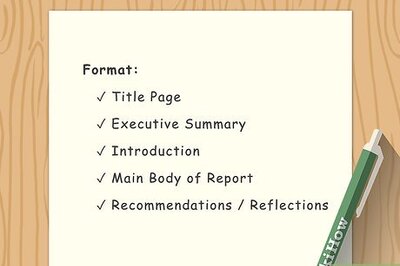
views
“New Digs” Meaning & Usage
“New digs” usually means a new place to live. Most of the time, when someone starts talking about their “new digs,” they’re referring to a new place to live, whether it’s an apartment, house, or other type of residence. Some people may also use it to describe a new office or desk at a job or a new location for a store. Sometimes, people use “new digs” when they talk about checking into temporary living arrangements like a hotel or vacation rental. In the UK, “student digs” refers to housing near a university or other type of school where students live. “I just got the keys to my new digs. Want to come over and check it out?” “How do you like your new digs at the office? I’d love to be that close to the snack bar.” “Cheri’s flight just landed, so we should give her a chance to settle into her new digs before heading to her room.” “I lived in the student digs the entire time I was at Oxford.”
Less commonly, “new digs” can refer to new clothes or shoes. This meaning may have started as confusion over similar-sounding slang terms “new duds” or “new togs,” which both mean “new clothing.” However, there’s no evidence of any strong links between the terms. Examples of how people use “new digs” to mean clothing are: “Wow! You look great in your new digs!” “I’m going on vacation in Hawaii, so I got a whole wardrobe of new digs.” “Check out my new digs!”
Origin & History of “New Digs”
The term “digs” probably comes from the old term “diggings.” The word “diggings” also means “living quarters.” The first appearance of “diggings” with this meaning was in 1838. It then appeared in the Charles Dickens novel Martin Chuzzlewit in 1844. The word “digs,” meaning lodgings, first appeared in print in 1893. Some have theorized “diggings” became a word for a place to live after the California or Australia gold rush when miners used the term to refer to their claims. However, gold wasn’t discovered in California until the beginning of 1848, 10 years after the first appearance of the term in the UK. The Australian gold rush didn’t begin until 1851.
More Slang Terms for Lodgings
Try a different slang term for your lodgings to change things up. Having several different ways to refer to the place you live helps you sound more natural when using slang, whether you’re a native English speaker or are learning it as a second language. Use these terms to help you build up your slang vocabulary. Pad: “Pad” has been used to refer to a bed since the 18th century. Then, in the mid-1900s, people started using it to describe a room with a bed and then a residence. For example, “He moved out of his parents’s house and into a bachelor’s pad.” Crib: “Crib” is an Old English word for a trough that holds food for livestock. By the 17th century, people began using “crib” to refer to a baby’s bed. In the 19th century, people started using the word to refer to dwellings. For example, “Let’s head back to my crib to play video games.” Shanty:It’s believed that using the word “shanty” to mean a residence comes from the Canadian French word chantier, which meant “lumber camp” or “hut.” In the past, this term meant the structure was small or shabby, but later, some used it to refer to their own home ironically. For example, “Welcome to my little 5-bedroom shanty.”
Other Slang Terms Using “Dig”
Dig in This slang term usually means to eat something, but it can also mean starting a project. It’s related to the traditional definition of dig, meaning to remove dirt, sand, or earth with a shovel or other tool. “I can’t wait to dig into Thanksgiving dinner. Turkey and stuffing is my favorite!” “My team is ready to dig into the new website project.”
Dig in your heels This means to be stubborn about something. It comes from the idea that when someone tries to physically move you, you put your weight into your heels, so you’re more difficult to move. “She thinks she can force me to go shopping with her, but I’m going to dig in my heels so I can stay home and read.” “I’m ready to move to Colorado, but Jeff is digging in his heels.”
Dig (insult) A dig also means an insult. This comes from the mid-15th century when dig meant “to penetrate.” The idea is that an insult is sharp and can penetrate deep enough to harm you. “I saw my ex, and he couldn’t help getting in a dig about me dating someone new.” “Is calling my shoes beige supposed to be a dig? That’s just the color.”
Dig (enjoy) When “dig” means that you enjoy something, it’s African American Vernacular English (AAVE) from the jazz circles of the 1930s. It’s a common term that was more popular in the mid-to-late 20th century. “I really dig classic jazz singers like Billie Holiday and Ella Fitzgerald.” “That’s a great suit, man. I really dig it!”
Dig (understand) When “dig” means “to understand,” it also comes from AAVE. The origin of slang terms isn’t always clear, but many believe this meaning comes from the Niger-Congo Wolof words deg or dega, which means “to understand or appreciate.” “I don’t want to help you move. You dig?” “I dig you. That actually makes a lot of sense.”
Dig (look) The slang term “dig” can mean to pay attention to or notice something. It’s also thought to come from AAVE originating in the Wolof words deg or dega. “Dig that guy wearing a top hat and pajamas.” “Dig that guy in the red coat. Isn’t he your cousin?”




















Comments
0 comment